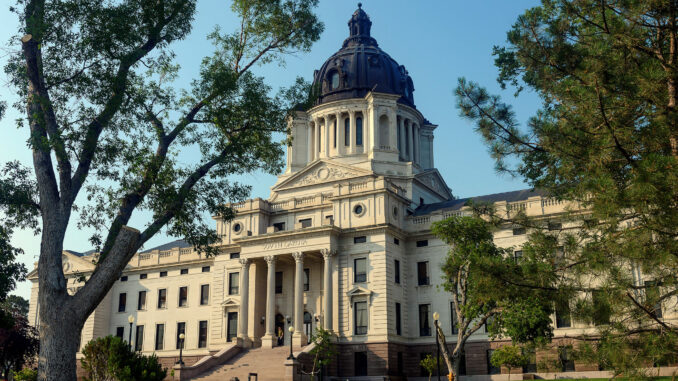
PIERRE, S.D. (AP) — The South Dakota Legislature on Thursday passed a proposal to give state lawmakers more control over how federal funds are spent, defying Gov. Kristi Noem and clearing the way for the House and Senate to find agreement on a $5.8 billion state budget.
The bipartisan proposal passed on the penultimate day of the legislative session with over two-thirds support in each chamber. It passed despite the Republican governor’s ardent objections. She will next have an opportunity to veto the bill, but if the two-thirds support in both chambers holds, the Legislature could override a veto.
The Republican-controlled House has sparred with Noem over the authority to spend federal funds this year. During budget negotiations, those lawmakers gained support from the Republican-controlled Senate, as well Democrats, and the proposal emerged to require a legislative budgeting committee to approve state government spending of federal funds if it requires a policy change.
As talks between the governor’s office and lawmakers broke down Thursday, Noem made a public appeal in an attempt to stop the federal spending oversight bill’s passage, calling it “bad government” in a Youtube video.
“It’s going to slow it down for people who utilize federal funds to help individuals in our state,” she said.
The governor made a last-ditch attempt to recruit lobbyists for industries that receive federal funding to halt the bill’s passage, but lawmakers remained undeterred.
Republican Rep. Chris Karr, who chairs the House Appropriations committee, argued the legislative oversight was necessary as the federal government has pumped billions of dollars through state government in packages covering pandemic recovery and infrastructure development.
“This is going to provide more transparency,” said Republican Rep. Taffy Howard, who has often been critical of government spending. “This was a hard-fought agreement worked out between the two chambers.”
The agreement between the House and Senate cleared the way for them to pass the $5.8 billion state budget that will take effect July 1. It includes a 6% raise proposed by Noem for state employees, school funding and health care providers.
Republican Sen. Jean Hunhoff, who led the Senate budget process, called it a “fiscally conservative” budget that made sure the windfall of funds that came from the federal government was allocated to one-time projects.
She said that teachers, state employees and health care workers, who have often been on the frontlines of the pandemic, deserved to be paid at competitive wages that kept up with inflation.
Democratic Sen. Reynold Nesiba said the funding increases should have been even higher to keep track with inflation, but called the budget “really good” for state government.
The governor’s spokesman Ian Fury said lawmakers passed “pretty much every budget coming to her desk,” and added that she was “working on interpreting” the implications of the federal spending oversight bill.
Lawmakers also approved $600 million in federal funding for water supply projects, $200 million to spur infrastructure projects around housing developments and over $100 million in projects for the state’s universities and technical colleges.
Republican Senate leader Sen. Gary Cammack lauded the funding packages as transformational for the state, saying they would impact quality of life, economic development and the agriculture industry.
He acknowledged the oversight of federal funding was not as popular in the Senate, but was a necessary concession to getting the budget passed.
“It’s a situation that in the end, we’ve got to work together,” he said.
